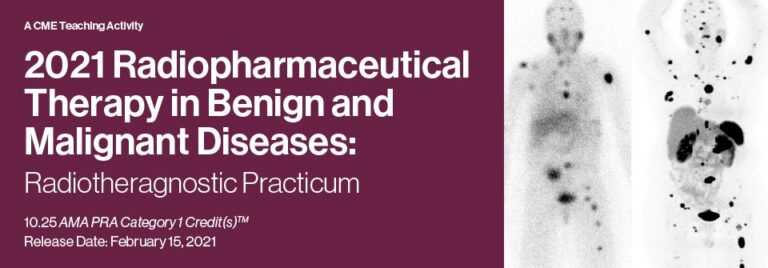This continuing education activity reviews best practices in the growing field of radiotheragnostics (aka theranostics or theragnostics) for benign and malignant diseases, beginning with the fundamentals and extending to include advanced clinical applications. A review of historically established therapies that have been optimally modernized as well as the recently introduced state-of-the-art modalities are included. The expert faculty discuss the optimization of the radiotheragnostic practices for best utilization of various radiopharmaceuticals in contemporary health care delivery systems, both academic and private practice settings.
Target Audience
This meeting is designed for nuclear medicine physicians, nuclear radiologists, oncologists, health physicists, and radiopharmacists.
Educational Objectives
At the completion of this CME activity, subscribers should be able to:
– The difference between the radiotheragnostic approach and various other concepts guiding the therapeutic delivery of radiation to the target tissues with the objective of improving health outcomes.
– The best therapeutic practice approaches to hyperthyroidism and other benign thyroid diseases, based on evidence and/or sound medical judgment.
– The best therapeutic practice approaches to differentiated thyroid carcinoma, based on evidence and/or sound medical judgment.
– The optimal applications of Y-90 Ibritumomab Tiuxetan for therapy of lymphoma.
– The optimal applications of I-131 Iobenguane to diagnostic imaging and therapy of Pheochromocytoma and Paraganglioma.
– The optimal applications of Y-90 Resin and Glass Microspheres to radioembolization therapy of liver cancers.
– The optimal applications of Ga-68 Dotatate Imaging and Lu-177 Dotatate therapy of neuroendocrine tumors.
– The optimal approach to diagnostic imaging of recurrent and metastatic prostate cancer.
– The best approach to therapy of skeletal metastatic disease using various Bone-Seeking radiopharmaceuticals.
– The practical examples for evaluation of not listed cancers for radiotheragnostics-based trials.
– Best approaches to building radiotheragnostic practice in academic institutions.
– Best approaches to building radiotheragnostic practice in private practice settings.
Topics/Speakers :
History & Practice of Radioiodine Therapy in Hyperthyroidism
Mark Tulchinsky, M.D., FACNM, FSNMMI, CCD
Overview of Targeted Therapy – Lessons Learned
Terence Z. Wong, M.D., Ph.D.
Radioiodine Therapy: Uncommon Benign Thyroid Conditions
Mark Tulchinsky, M.D., FACNM, FSNMMI, CCD
I-131 Iobenguane Imaging & Therapy for Pheochromocytoma/Paraganglioma
Erik S. Mittra M.D., Ph.D.
Radioiodine in Thyroid Cancer – Basics
Mark Tulchinsky, M.D., FACNM, FSNMMI, CCD
Radioiodine in Thyroid Cancer – Advanced
Mark Tulchinsky, M.D., FACNM, FSNMMI, CCD
Radioembolization Therapy with Y-90 Resin and Glass Microspheres
Terence Z. Wong, M.D., Ph.D.
Ga-68/Lu-177 Dotatate Imaging/Therapy of Neuroendocrine Tumors
Erik S. Mittra M.D., Ph.D.
Diagnostic Imaging of Recurrent and Metastatic Prostate Cancer
Samuel Mehr, M.D.
Therapy for Skeletal Metastatic Disease with Bone-Seeking Agents
Terence Z. Wong, M.D., Ph.D.
Radiotheragnostics in Prostate Cancer
Terence Z. Wong, M.D., Ph.D.
Pivotal Trials in the USA for Up-and-Coming Radiotheragnostics
Erik S. Mittra M.D., Ph.D.
Opportunities for Somatostatin Receptor Targeting in Avid Cancers
Samuel Mehr, M.D.
Building Nuclear Medicine Therapy Program in Academic Practice
Erik S. Mittra M.D., Ph.D.
Building Nuclear Medicine Therapy Program in Private Practice
Samuel Mehr, M.D.


